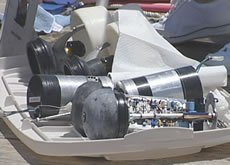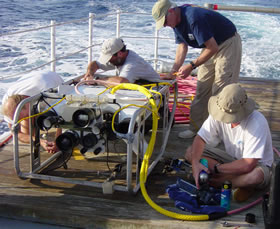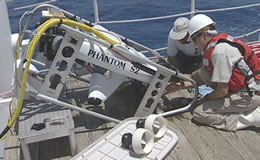|
 |
 |
 |
 |
|
Daily
At-Sea Logs May 5th, 2003 |
| May
5, 03
Bermuda Triangle, “the proof” By: Dewey Golub, Project Oceanica, Webmaster & Technology Specialist Lance Horn,
NURC/UNCW Operations Manager reached the bridge and exclaimed, “This
is the worst trip I’ve ever had,”- no small statement
coming from a man with fifteen years experience and over a thousand
logged ROV dives. Yesterday, the ROV video lamps were consumed in flame. These are high intensity halogen bulbs that should only be on underwater. At the end of the previous dive they were not turned off before the ROV was powered down. In the morning, the other ROV operator powered the unit up expecting all the auxiliary systems to be off. The lights were, unfortunately, on and our small, somewhat exciting shipboard fire ensued. When working in tiring, complex situations, small mistakes or oversights can quickly lead to serious situations. Another
"event" occurred today. Normally, the ROV operations team
keeps a specific position on the ROV during a dive by associating
its underwater position with the ship’s GPS. This is done by
Sometimes
you can plan, communicate and pay attention to every detail, and things
still go wrong. A third event occurred on April 30. Flooding of the
NURC ROV is an unexplained phenomenon, which has never happened in
fifteen years of operation—never mind twice in the same mission!
On our first day of operations we had three successful ROV dives and
had just launched dive #4. The ROV control screen went black. Lance
Horn, ROV operator, immediately called for the unit to be hauled back
on deck. The moment the unit broke the surface and was suspended in
mid-air, we saw the problem. Seawater poured from a large hole in
the front of the ROV where a dangling hull end-cap hung from the front
of the vehicle. After cleaning and drying every aspect of the ROV’s
interior, it was rebuilt and attached to the vacuum pump. The ROV
held the vacuum seal with no change in pressure overnight. Unable
to explain if and how water might have entered the secure body unit
o Truly, success
in life requires preparedness, focused attention on your work, and
being able to problem solve. These are all skills you should develop
every day. Thanks for learning along with us here aboard the M/V Liberty
Star on Oculina Banks 2003 mission. |

 sending
and measuring a signal sent from a hydrophone on the ship to the ROV.
The hydrophone is mounted on a pole that extends beneath the hull
during operations and is retracted into the hull when the ship gets
underway. The ship’s crew is not used to retracting the hydrophone—most
of their instruments can travel while the ship is at full speed. The
ROV operations team must emphasize how important it is to retract
the hydrophone after operations, before transiting to the next dive
site. Today, the ship powered up to speed with the hydrophone down.
The hydrophone flooded. Both the ROV operations team and the ship's
crew assumed the other was raising the hydrophone. Now we are without
a tool vital to operations. This doesn’t mean we cannot dive
and record, but an assumption and simple lack of communication affected
the total operation.
sending
and measuring a signal sent from a hydrophone on the ship to the ROV.
The hydrophone is mounted on a pole that extends beneath the hull
during operations and is retracted into the hull when the ship gets
underway. The ship’s crew is not used to retracting the hydrophone—most
of their instruments can travel while the ship is at full speed. The
ROV operations team must emphasize how important it is to retract
the hydrophone after operations, before transiting to the next dive
site. Today, the ship powered up to speed with the hydrophone down.
The hydrophone flooded. Both the ROV operations team and the ship's
crew assumed the other was raising the hydrophone. Now we are without
a tool vital to operations. This doesn’t mean we cannot dive
and record, but an assumption and simple lack of communication affected
the total operation. f
the ROV, we resumed operations. After four successful dives, we encountered
the same, never- experienced-before-this-mission, phenomenon. The
ROV reached a depth of approximately 50 feet and flooded. Again the
unit was retrieved, cleaned, dried, pressure-tested and found to be
in complete working order. We are now four more dives into the unit’s
third life with no problems at all. We do hook up the vehicle to a
vacuum pump every other dive to create some suction inside its hull.
The lessons to be learned include: whenever you embark on an offshore
project, bring plenty of spare parts, never give up on a problem,
and try not to focus your life’s work within THE BERMUDA TRIANGLE.
f
the ROV, we resumed operations. After four successful dives, we encountered
the same, never- experienced-before-this-mission, phenomenon. The
ROV reached a depth of approximately 50 feet and flooded. Again the
unit was retrieved, cleaned, dried, pressure-tested and found to be
in complete working order. We are now four more dives into the unit’s
third life with no problems at all. We do hook up the vehicle to a
vacuum pump every other dive to create some suction inside its hull.
The lessons to be learned include: whenever you embark on an offshore
project, bring plenty of spare parts, never give up on a problem,
and try not to focus your life’s work within THE BERMUDA TRIANGLE.